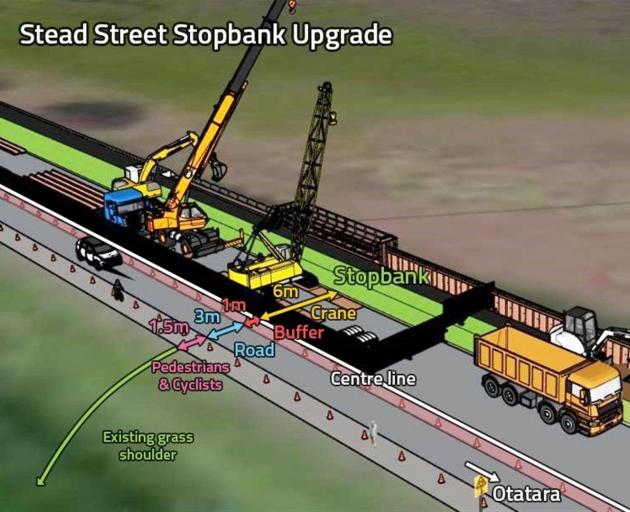
It was hoped the road could be reopened to two lanes at the end of last month but the impact of Covid-19 on the crews working on site has meant a delay of the reopening date.
The Invercargill City Council changed Stead St, the road that links the central city to the suburb of Otatara, to a one-lane, one-way thoroughfare in November to allow the installation of a sheet pile wall along the stopbank, as part of a key climate resilience project.
Council engineering services manager Jeremy Rees said he was pleased to be able to confirm Stead St would reopen to two-way, 30kmh traffic from Friday.
"An exact time for the road reopening would be determined on the day as the crews work to clear the way, so Otatara residents can prepare to access the city via Stead St from Friday afternoon," he said.
The council has been upgrading both the Stead St and Cobbe Rd stopbanks with a sheet pile wall and earthen embankment to protect the city, Invercargill Airport and critical infrastructure from extreme weather events, sea-level rise and further effects of climate change.
"The Stead St stopbank upgrade has been a major piece of infrastructure that paves the way for Murihiku to become a climate-resilient city of the future," Mr Rees said.
"We are pleased to be making progress on this significant project, including the completion of the sheet pile wall, which was completed ahead of time and budget, and allowed us to undertake some extra drainage work."
Landscaping, planting and footpath works would continue in the coming months, and the current temporary pedestrian and cycle path arrangement would remain in place while work continued on the upgraded stopbank cycleway, he said.
"Health and safety of our workers has been a key consideration when considering the reopening date, and keeping the speed limit to 30kmh at all can time ensures we can safely provide a pedestrian pathway alongside the road."
"We thank the people of Otatara and the wider Invercargill community for their patience as we future-proof our city and undertake this crucial climate resilience work."
Work was scheduled to finish in July.
The council was investing $4.7million in the project with additional funding of $10.8million from Kanoa, the Regional Economic Development and Investment Unit, as part of a wider focus on the region’s flood protection and river management schemes.
Support for several "shovel-ready" projects in Southland was announced in 2020.
Contractors, subcontractors and staff working on project banded together earlier this month to clean up the estuary and clear rubbish that had accumulated in the space.
"We understand the importance of the estuary to mana whenua and to kaitiakitaka, and so our teams wanted to put in some effort to tidy up and honour the area," Mr Rees said.
-- Staff Reporter












